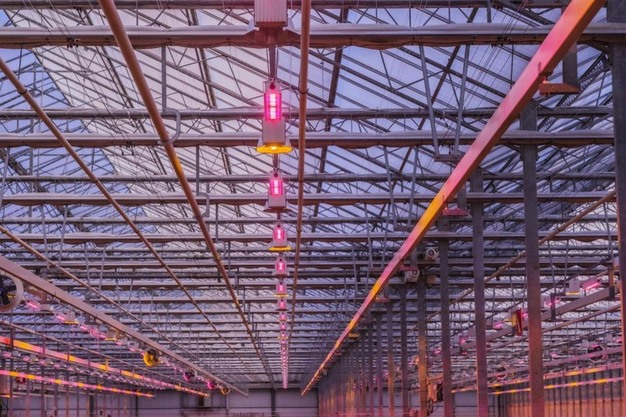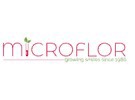"Limitation of drain water volume, maximum reduction of ballast and residue in fertilizers and disinfectants and crop protection agents, and a treatment system tailored to our cultivation: the sustainability of our water consumption is an interplay of diverse factors," says the MicroFlor team.
Reusing pouring water
For example, their water extraction consists exclusively of rainwater, and they recover as much irrigation water as possible. "Because our greenhouses have all been equipped with ErfGoedVloeren since 2018, we limit our rainwater consumption," they further explain. A significant gain. "Because we are so conscious of how we use our rainwater, we are able to use it effectively, even in very dry summers."

How exactly does such an ErfGoedVloer work? Because this cultivation floor is made up of several layers, the water drains evenly and slowly to the drainage pit. Then, disinfection takes place. Via UV light, fungi, bacteria, nematodes, and viruses are rendered harmless. An additional disinfection with hydrogen peroxide (H202) follows during pouring. After this oxidation process, the water is purified and ready to be reused. "In this way, we make optimal use of our pouring water. Another water-saving action? We pour only when our plants need it. The weight of our plants is constantly monitored and used as a basis for the watering strategy. Because if we look back at 2018, we see a significant decrease in water use, and that while we have increased in area."
Purifying reeds for sluice water
Obviously, they cannot reuse all water. "Our wastewater, whether from flushing filters or excess drain water, also undergoes a thorough 100% biological purification via reed beds. In such a reed bed, reed interacts with other aquatic plants and microorganisms. A natural water purification that relies on the self-purifying processes of water, soil, and plants. And that without using an artificial supply of energy or other necessary substances," they point out.
The water thus meets all the environmental standards the grower aims for. "Even though those standards tighten every year, with our reed beds, we are sure to continue to meet them in the future."
Growing MPS since 1997
Which brings us to MPS (Milieu Project Sierteelt). With this label, you prove that you make efforts to do business with respect for people and nature. Today, certification is the standard for competing on the market. Microflor jumped on this bandwagon back in 1997. At first, with the basis of MPS-VMS, it was supplemented in 2010 with the first MPS-GAP certificate. A quality manual with standards on traceability, environment, personnel, and recall procedures. "In 2017, we raised the bar even higher with MPS-ProductProof."
This label indicates how a producer scores relative to others in terms of fertilization, pesticides, energy consumption, and waste disposal. In addition, the label shows that you do not use prohibited active substances in cultivation. Read all about it in the blog "Environmental care certification: this is how we guarantee you transparency and sustainability.
Green light for LED
In addition to water, energy is also a challenge. "We are currently systematically replacing our classic Son-T lamps with energy-efficient LED lamps. An investment with which we want to reduce our energy consumption. Small downside? LED lamps, unlike the Son-T lamps, give off less heat, so we have to add some extra heating. We are currently doing that with our CHP. Behind the scenes, we are putting all our efforts into a sustainable alternative. In the first place, by using energy economically and researching alternatives. Think of energy screens and air dehumidification with heat recovery. The ultimate goal is fossil-free cultivation."
For more information:
Microflor
Lichtelarestraat 87
9080 Lochristi, Belgium
Tel.: +32 9 326 82 80
[email protected]
www.microflor.com
